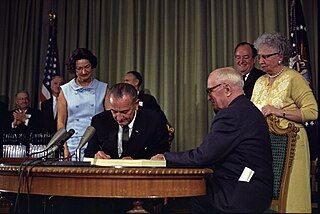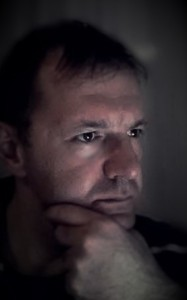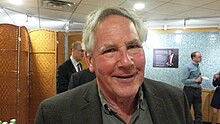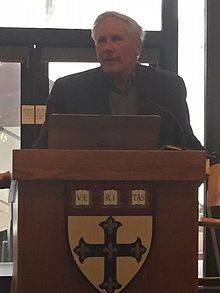
Arthur L. Caplan is an American ethicist and professor of bioethics at New York University Grossman School of Medicine.
Joseph J. Fins, M.D., D. Hum. Litt., M.A.C.P., F.R.C.P. is an American physician and medical ethicist. He is chief of the Division of Medical Ethics at New York Presbyterian Hospital and Weill Cornell Medical College, where he serves as The E. William Davis Jr., M.D. Professor of Medical Ethics, and Professor of Medicine, Professor of Public Health, and Professor of Medicine in Psychiatry. Fins is also Director of Medical Ethics and an attending physician at New York Presbyterian Hospital-Weill Cornell Medical Center. Fins is also a member of the adjunct faculty of Rockefeller University and has served as Associate for Medicine at The Hastings Center. He is the Solomon Center Distinguished Scholar in Medicine, Bioethics and the Law and a Visiting Professor of Law at Yale Law School. He was appointed by President Bill Clinton to The White House Commission on Complementary and Alternative Medicine Policy and currently serves on The New York State Task Force on Life and the Law by gubernatorial appointment.
Govert A. den Hartogh is a Dutch moral, legal and political philosopher. He studied theology in Kampen and philosophy in Leiden and Oxford. He received his PhD in philosophy in 1985 from the University of Amsterdam. From 1974 on he worked at the University of Amsterdam as assistant and associate professor of ethics and jurisprudence in the Philosophy Department and the Faculty of Law, as an extra-ordinary professor of medical ethics in the Faculty of Medicine, and as a full professor of ethics and its history in the Philosophy Department. In 1992 he took the initiative of founding the Netherlands School for Research in Practical Philosophy, together with Robert Heeger and Bert Musschenga, and functioned as the school's first director. He retired in 2008. At his retirement his former Ph.D. students published a Festschrift.

Allen Edward Buchanan is a moral, political and legal philosopher. As of 2022, he held multiple academic positions: Laureate Professor of Philosophy at the University of Arizona, Distinguished Research Fellow at Oxford University, Visiting Professor of the philosophy of international law at the Dickson Poon School of Law at King's College, London, and James B. Duke Professor Emeritus at Duke University.

The philosophy of healthcare is the study of the ethics, processes, and people which constitute the maintenance of health for human beings. For the most part, however, the philosophy of healthcare is best approached as an indelible component of human social structures. That is, the societal institution of healthcare can be seen as a necessary phenomenon of human civilization whereby an individual continually seeks to improve, mend, and alter the overall nature and quality of their life. This perennial concern is especially prominent in modern political liberalism, wherein health has been understood as the foundational good necessary for public life.

Daniel I. Wikler is an American public health educator, philosopher, and medical ethicist. He is currently the Mary B. Saltonstall Professor of Population Ethics and Professor of Ethics and Population Health in the Department of Global Health and Population of the Harvard T.H. Chan School of Public Health in Boston. He is Director and a core faculty member in the Harvard Program in Ethics and Health (PEH). His current research interests are ethical issues in population and international health, including the allocation of health resources, health research involving human subjects, organ transplant ethics, and ethical dilemmas arising in public health practice, and he teaches several courses each year. He is a fellow of the Hastings Center, an independent bioethics research institution.
Hugo Adam Bedau was the Austin B. Fletcher Professor of Philosophy, Emeritus, at Tufts University, and is best known for his work on capital punishment. He has been called a "leading anti-death-penalty scholar" by Stuart Taylor Jr., who has quoted Bedau as saying "I'll let the criminal justice system execute all the McVeighs they can capture, provided they'd sentence to prison all the people who are not like McVeigh."

Vojin B. Rakic is a Serbian philosopher and political scientist. He publishes in English, but also in Serbian. He has a PhD in political science from Rutgers University in the United States. His publications on ethics, bioethics, Kant, and cosmopolitan justice are considered as influential writings in the international academic arena, as can be read in the references to Rakić`s works, the endorsements of his two latest books, as well as in the open letter of support for Rakić that has been signed by dozens of the world`s most reputed (bio)ethicists and philosophers, in which they state their opinion about him.
Michael Alan Grodin is Professor of Health Law, Bioethics, and Human Rights at the Boston University School of Public Health, where he has received the distinguished Faculty Career Award for Research and Scholarship, and 20 teaching awards, including the "Norman A. Scotch Award for Excellence in Teaching." He is also Professor of Family Medicine and Psychiatry at the Boston University School of Medicine. In addition, Dr. Grodin is the Director of the Project on Medicine and the Holocaust at the Elie Wiesel Center for Judaic Studies, and a member of the faculty of the Division of Religious and Theological Studies. He has been on the faculty at Boston University for 35 years. He completed his B.S. degree at the Massachusetts Institute of Technology, his M.D. degree from the Albert Einstein College of Medicine, and his postdoctoral and fellowship training at UCLA and Harvard University.
Leonard Michael Fleck is an American philosophy professor and medical ethicist. He earned his Ph.D. from St. Louis University in 1975 and taught courses at St. Mary's College (Indiana) before going on to teach and at Michigan State University where he currently holds a dual appointment with the philosophy department and the Center for Ethics and Humanities in the Life Sciences. Fleck was also a member of Hillary Clinton's Task Force on Health Reform in 1993 and the staff ethicist for the Michigan governor's task force on access to health care in 1989-1990.
Ann M. Mongoven is an American philosophy professor and medical ethicist. She earned her Ph.D. in religious studies/ethics from the University of Virginia in 1996 and a M.P.H. from the Johns Hopkins University Bloomberg School of Public Health in 2006. Mongoven taught courses at Indiana University/Bloomington before going on to teach at Michigan State University where she currently holds a dual appointment with the philosophy department and the Center for Ethics and Humanities in the Life Sciences. Mongoven is also a Michigan State University Lilly Teaching Fellow and was an ethics consultant for the United States Department of Health and Human Services.
Daniel Sulmasy is an American medical ethicist and former Franciscan friar. He has been Acting Director of the Kennedy Institute of Ethics and on the faculty of the Pellegrino Center for Clinical Bioetics was also named He is the inaugural Andre Hellegers Professor of Biomedical Ethics, with co-appointments in the Departments of Philosophy and Medicine at Georgetown.
Rashi Fein was an American health economist termed "a father of Medicare" in the United States and "an architect of Medicare," was Professor of Economics of Medicine, Emeritus, in the Department of Global Health and Social Medicine at Harvard Medical School, and the author of the book Medical Care, Medical Costs: The Search for a Health Insurance Policy.
Dariush Mozaffarian is a cardiologist, Jean Mayer Professor at the Friedman School of Nutrition Science and Policy at Tufts University, Professor of Medicine at Tufts School of Medicine, and an attending physician at Tufts Medical Center. His work aims to create the science and translation for a food system that is nutritious, equitable, and sustainable. Dr. Mozaffarian has authored more than 500 scientific publications on dietary priorities for obesity, diabetes, and cardiovascular diseases, and on evidence-based policy approaches and innovations to reduce diet-related diseases and improve health equity in the US and globally. Some of his areas of interest include healthy diet patterns, nutritional biomarkers, Food is Medicine interventions in healthcare, nutrition innovation and entrepreneurship, and food policy. He is one of the top cited researchers in medicine globally, he has served in numerous advisory roles, and his work has been featured in an array of media outlets.
Mark V. Pauly is an American economist whose work focuses on healthcare management and business economics. He is currently the Bendheim Professor in the Department of Health Care Management at the Wharton School of the University of Pennsylvania. Pauly is a former commissioner on the Physician Payment Review Commission, and has been a consultant to the Congressional Budget Office, the Office of the Secretary of the U.S. Department of Health and Human Services, the American Enterprise Institute, and served on the Medicare Technical Advisory Panel. He is also the Co-Editor-in-Chief of the Springer journal International Journal of Health Care Finance and Economics, and was formerly the Robert D. Eilers Professor from 1984 to 1989.
Laurie Zoloth is an American ethicist, currently Margaret E. Burton Professor at the University of Chicago Divinity School. She was dean of the Divinity School from 2017 to 2018, whereupon she stepped into an advisory administrative position.

Christine I. Mitchell is an American filmmaker and bioethicist and until her retirement in September 2022, the executive director of the Center for Bioethics at Harvard Medical School (HMS).
Susan Sherwin is a Canadian philosopher. Her pioneering work has shaped feminist theory, ethics and bioethics, and she is considered one of the world's foremost feminist ethicists.
Eric M. Meslin PhD FRSC FCAHS is a Canadian-American philosopher-bioethicist and current President and CEO of the Council of Canadian Academies (CCA).
Helen L. Smits was a health policy influencer and advocate in the United States, and lent her voice to several healthcare initiatives abroad. Most notably, she was a recipient of the Fulbright scholarship and served under the Carter and Clinton administrations. She also held positions in government organizations including the National Institutes of Health (NIH) and Healthcare Financing Administration.







